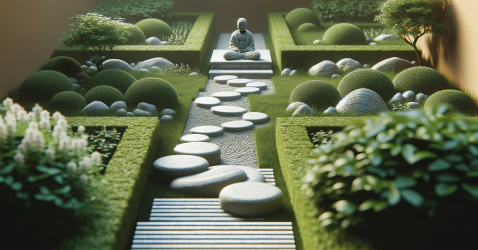What Are Natural Self-care Remedies For Stress Relief?
In this article, we will explore a range of natural self-care remedies that can help you find relief from stress. Life can often get overwhelming, and it’s essential to prioritize your mental well-being. Instead of relying solely on traditional methods, why not explore natural alternatives that can provide effective stress relief? From herbal teas to meditation techniques, we will uncover a variety of options that can help you unwind and find peace in the midst of a busy world. So, let’s delve into the realm of natural self-care remedies and discover the power they hold in alleviating stress.
Exercise and Physical Activity
Yoga and Meditation
Yoga and meditation are fantastic forms of physical activity that not only promote a healthy body but also cultivate a calm and centered mind. Yoga combines physical postures with breathing exercises and meditation, encouraging you to connect with your body and find inner peace. The practice of yoga improves flexibility, strengthens muscles, and enhances balance and posture. Meditation, on the other hand, focuses on mindfulness and relaxation, quieting the mind and reducing anxiety. By incorporating yoga and meditation into your routine, you can relieve stress, improve your overall well-being, and achieve a sense of serenity.
Aerobic Exercise
Engaging in aerobic exercise is another excellent way to combat stress and promote a healthy lifestyle. Aerobic activities include running, swimming, cycling, or taking aerobic classes. These activities increase your heart rate, improve cardiovascular health, and release endorphins, also known as the “feel-good” hormones. Endorphins help reduce pain, elevate mood, and increase energy levels. As you engage in aerobic exercise, your body naturally releases tension and stress, leaving you feeling rejuvenated and revitalized.
Tai Chi
Originating from ancient Chinese martial arts, Tai Chi is a gentle and slow-moving exercise that focuses on slow and deliberate movements, deep breathing, and mindfulness. It is often referred to as a moving meditation. This practice incorporates relaxation, balance, and coordination, combining physical and mental well-being. Tai Chi improves flexibility, builds strength and endurance, and reduces stress and anxiety. Its fluid movements and controlled breathing can help you find a sense of tranquility and calmness after a long and hectic day.
Pilates
Pilates is a low-impact exercise that targets the core muscles, promoting strength, flexibility, and stability. It involves a series of controlled movements that engage both the body and the mind. Pilates emphasizes proper alignment, breathing, and concentration, encouraging you to focus on the present moment. It improves posture, tones muscles, and develops a strong core. By practicing Pilates regularly, you can reduce stress levels, enhance body awareness, and improve overall physical and mental well-being.
Healthy Eating Habits
Eating a Balanced Diet
Maintaining a well-balanced diet is crucial for your overall health and stress relief. Opt for a variety of whole foods, including fruits, vegetables, whole grains, lean proteins, and healthy fats. These nutrient-rich foods provide your body with the necessary vitamins, minerals, and antioxidants to combat stress and support optimal functioning. Avoid excessive consumption of processed foods, sugary snacks, and beverages as they can contribute to inflammation and worsen stress levels. Remember, eating a balanced diet not only nourishes your body but also promotes a sense of well-being.
Consuming Stress-Reducing Foods
Certain foods have stress-reducing properties that can help calm your mind and relax your body. Incorporating these foods into your diet can contribute to stress relief. Examples of stress-reducing foods include green leafy vegetables, which are rich in magnesium and promote relaxation, and fatty fish like salmon, which contain omega-3 fatty acids known for their mood-boosting properties. Additionally, foods such as dark chocolate, berries, and herbal teas like chamomile or lavender can have soothing effects on your nervous system. By including these stress-reducing foods in your meals, you can enhance your ability to manage stress effectively.
Avoiding Stimulants
While it may be tempting to reach for that cup of coffee or energy drink when you’re feeling stressed, consuming stimulants can actually exacerbate your anxiety levels. Stimulants like caffeine and nicotine can increase heart rate, blood pressure, and nervousness, leaving you feeling more on edge. Consider limiting your intake of caffeinated beverages, such as coffee, tea, and soda, and opt for herbal teas or decaffeinated versions instead. By avoiding stimulants, you can create an environment in your body that is conducive to relaxation and stress relief.
Drinking Herbal Teas
Herbal teas have long been known for their calming and soothing properties. Drinking a cup of herbal tea can provide a moment of tranquility in a busy day and help alleviate stress. Chamomile tea, for example, contains compounds that bind to brain receptors and promote relaxation. Lavender tea has been shown to reduce anxiety levels and induce a sense of calmness. Peppermint tea can relieve tension and ease digestion, promoting a feeling of well-being. Experiment with different herbal teas and find the ones that resonate with you the most. Sipping on a warm cup of herbal tea can be a delightful self-care practice that assists in stress relief.
Quality Sleep
Establishing a Bedtime Routine
Having a regular bedtime routine plays a crucial role in improving the quality of your sleep. Establish a consistent routine that signals to your body and mind that it’s time to wind down and prepare for sleep. This may include activities such as dimming the lights, reading a book, taking a warm bath, or practicing relaxation techniques. By creating a calming routine, you allow your body to transition from the busyness of the day to a peaceful state, facilitating a restful night’s sleep.
Creating a Relaxing Sleep Environment
Your sleep environment significantly impacts the quality of your sleep. Create a space that promotes relaxation and tranquility. Keep your bedroom cool, dark, and quiet to reduce any disturbances that may disrupt your sleep. Invest in a comfortable mattress and pillows that provide adequate support for your body. Consider using blackout curtains, earplugs, or a white noise machine to create a soothing environment. By optimizing your sleep environment, you set the stage for a restorative night’s sleep.
Avoiding Electronic Devices at Night
The blue light emitted by electronic devices such as smartphones, tablets, and computers can interfere with your body’s natural sleep-wake cycle. Exposure to blue light in the evening suppresses the production of melatonin, a hormone that regulates sleep. To promote quality sleep, it is recommended to avoid electronic devices for at least an hour before bedtime. Instead, engage in relaxing activities such as reading a book, practicing deep breathing exercises, or listening to calming music. By giving yourself a break from screens, you allow your mind to unwind and prepare for a peaceful slumber.
Practicing Deep Breathing Exercises
Deep breathing exercises are an effective technique to calm your mind and prepare your body for sleep. By focusing on your breath, you activate the body’s relaxation response, reducing stress and promoting a sense of calmness. One simple deep breathing exercise involves inhaling deeply through your nose, allowing your belly to expand, and exhaling slowly through your mouth. Repeat this pattern several times, paying attention to the sensations of your breath. Incorporating deep breathing exercises into your bedtime routine can help you release tension, quiet your mind, and drift off into a peaceful sleep.
Relaxation Techniques
Deep Breathing Exercises
Deep breathing exercises are a fundamental relaxation technique that can be done anywhere, at any time. By focusing on your breath and taking slow, deep breaths, you activate the body’s relaxation response, counteracting the effects of stress. Deep breathing increases oxygen flow to the brain, calms the nervous system, and promotes a sense of tranquility. Practice deep breathing exercises whenever you feel overwhelmed or anxious. Inhale deeply through your nose, allowing your belly to expand, and exhale slowly through your mouth. Repeat this pattern for several breaths, feeling a sense of peace wash over you.
Progressive Muscle Relaxation
Progressive muscle relaxation is a technique that involves sequentially tensing and relaxing groups of muscles to release physical tension and achieve deep relaxation. Start by tensing your muscles in one area, such as your hands, and then gradually release the tension as you exhale. Move on to the next muscle group, such as your arms or shoulders, and repeat the process. By systematically relaxing your muscles, you can release pent-up tension and experience a profound sense of relaxation throughout your entire body. Practice progressive muscle relaxation regularly to reduce stress, promote better sleep, and enhance overall well-being.
Guided Imagery
Guided imagery is a relaxation technique that uses visualization to create a mental image and evoke a sense of calmness. Find a comfortable position, close your eyes, and imagine yourself in a peaceful and serene location, such as a beach or a forest. Engage your senses by visualizing the scenery, feeling the warmth of the sun, hearing the sound of waves or birds, and smelling the scent of nature. Allow yourself to immerse in this tranquil imagery, letting go of any stress or tension. Guided imagery can help reduce anxiety, promote relaxation, and foster a state of mental well-being.
Journaling
Journaling is a stress-relieving practice that allows you to express your thoughts and emotions, providing a sense of clarity and release. Set aside a few minutes each day to write freely in a notebook or journal. Pour your thoughts onto the pages, without judgment or censorship. Write about your feelings, experiences, or anything that is on your mind. Journaling offers a private space for reflection and self-discovery, enabling you to gain insights, process emotions, and alleviate stress. Make journaling a regular part of your self-care routine, and experience the therapeutic benefits it can bring to your life.
Soothing Music and Sound Therapy
Listening to Calming Music
Music has a powerful impact on our emotions and can be a tool for relaxation and stress relief. Experiment with different genres and find the types of music that calm your mind and soothe your soul. Instrumental music, such as classical or ambient, is often recommended for its soothing qualities. Create playlists of your favorite calming songs and listen to them when you need a moment of tranquility. Incorporating calming music into your daily routine can help reduce stress, improve mood, and create a peaceful atmosphere.
Nature Sounds and White Noise
Nature sounds and white noise have been found to be highly effective in promoting relaxation and masking background noises that can interfere with sleep or focus. The sounds of rain, ocean waves, or forest ambiance can create a serene environment that promotes a sense of calmness and reduces stress. White noise machines or apps can also be used to generate a consistent and relaxing background noise that masks distractions and induces relaxation. Whether you prefer the gentle sounds of nature or the steady hum of white noise, incorporating these ambient sounds into your daily life can enhance your well-being.
Binaural Beats
Binaural beats are a type of sound therapy that uses different frequencies played in each ear to create a perceived beat that can influence brainwave activity. The brain synchronizes to this beat, promoting states of relaxation or focus. Binaural beats are often used to induce deep relaxation and improve sleep quality. Many apps and websites offer binaural beats tracks for various purposes, such as stress relief, meditation, or sleep enhancement. Incorporating binaural beats into your relaxation routine can provide an additional layer of sound therapy to support your well-being.
Sound Baths
Sound baths are immersive experiences where soothing sounds and vibrations from various instruments, such as crystal singing bowls or gongs, are used to induce deep relaxation and therapeutic effects. By lying down and allowing the sounds to wash over you, you can experience a state of deep peace and tranquility. Sound baths are often offered in wellness centers or can be accessed through guided recordings. Regular participation in sound baths can reduce stress, promote emotional balance, and enhance overall well-being.
Aromatherapy
Lavender Essential Oil
Lavender essential oil is widely renowned for its calming and relaxing properties. The scent of lavender has been shown to reduce anxiety levels and improve sleep quality. You can use lavender essential oil by adding a few drops to a diffuser, applying it to your pulse points, or mixing it into a carrier oil for a soothing massage. Inhaling the aroma of lavender can promote a sense of peace and tranquility, providing relief from stress and tension.
Chamomile Essential Oil
Chamomile essential oil is often used for its calming and stress-relieving properties. The gentle and comforting scent of chamomile promotes relaxation and can help soothe anxious feelings. Like lavender oil, chamomile oil can be diffused, applied topically, or used in a relaxing bath. Incorporating chamomile essential oil into your self-care routine can create a soothing environment and support your overall well-being.
Rose Essential Oil
Rose essential oil is known for its uplifting and mood-enhancing properties. Its delicate and floral aroma can help reduce stress and anxiety while promoting a sense of happiness and relaxation. Use rose essential oil by diffusing it, adding a few drops to a warm bath, or diluting it in a carrier oil for a massage. Allow the scent of roses to envelop you, lifting your spirits and soothing your mind.
Ylang Ylang Essential Oil
Ylang ylang essential oil is a fragrant oil that is often used to promote relaxation and alleviate stress. Its sweet and floral scent has been associated with reducing heart rate and blood pressure, promoting a sense of calmness. Use ylang ylang essential oil in a diffuser, add a few drops to a warm bath, or dilute it in a carrier oil for a relaxing massage. Allow the aroma of ylang ylang to transport you to a place of tranquility and serenity.
Art Therapy
Coloring Books for Adults
Coloring books for adults have gained popularity as a stress-relieving and creative activity. Engaging in coloring can induce a state of mindfulness, allowing you to focus on the present moment and let go of stressors. Choose intricate coloring books with designs that appeal to you and spend time coloring with colored pencils or markers. The repetitive and calming nature of coloring can help calm your mind, reduce anxiety, and release tension, providing a therapeutic outlet for stress relief.
Painting and Drawing
Painting and drawing are expressive forms of art therapy that allow you to tap into your creativity and emotions. You don’t need to be an artist to benefit from these activities; simply let go of judgment and allow yourself to freely paint or draw. Experiment with different mediums, such as watercolors, acrylics, or pencils, and let your imagination guide you. Painting and drawing can act as a form of release, enabling you to process emotions and find solace in the act of creating.
Creating Collages
Collage-making is a versatile and engaging art therapy technique that involves assembling different materials, such as images, words, or objects, onto a surface to create a cohesive composition. Collages can be created with magazine cutouts, photographs, found objects, or even digital materials. The act of collage-making allows you to express yourself, explore your thoughts and feelings, and create something visually pleasing. It can be a therapeutic practice that provides relaxation, promotes self-reflection, and encourages creativity.
Pottery and Sculpting
Pottery and sculpting offer a hands-on and tactile experience that can be deeply therapeutic. Working with clay or other sculpting materials enables you to engage your senses and express yourself through shaping and molding. The process of pottery and sculpting can be meditative, allowing you to focus on the sensation of the clay and the act of creating. Whether you choose to create functional pottery or abstract sculptures, pottery and sculpting can be a form of self-expression and stress relief.
Social Support and Connection
Talking to Friends or Family
Maintaining strong relationships with friends and family members is essential for stress relief and overall well-being. Reach out to your loved ones and engage in meaningful conversations. Share your experiences, thoughts, and emotions with them. Discussing your stressors and seeking support can help alleviate the burden you may be carrying. Connecting with friends and family provides a sense of belonging, support, and understanding, fostering a positive and nurturing environment.
Joining Support Groups
Sometimes, connecting with individuals who are experiencing similar challenges can be incredibly beneficial for stress relief. Consider joining a support group that focuses on the specific stressors or issues you are dealing with. Whether it’s a support group for new parents, individuals with chronic illness, or those going through a life transition, sharing your experiences and receiving support from others who can relate can be invaluable. Support groups offer a safe space to discuss your concerns, gain insights, and develop coping strategies.
Engaging in Hobbies or Clubs
Engaging in hobbies or joining clubs is a fantastic way to relieve stress and forge new connections. Consider pursuing activities that you are passionate about or curious to explore. Whether it’s playing a musical instrument, joining a book club, or participating in a sports team, engaging in hobbies allows you to immerse yourself in activities that bring you joy and fulfillment. Additionally, participating in clubs or group activities provides opportunities to meet like-minded individuals, expanding your social network and fostering a sense of belonging.
Attending Social Events
Attending social events can provide a sense of belonging and offer opportunities for connection and stress relief. Look for community gatherings, networking events, or cultural activities happening in your area. By actively participating in social events, you can meet new people, engage in conversations, and create meaningful connections. Attending social events not only allows you to reduce stress by engaging in enjoyable activities but can also provide a support system in times of need.
Time Management and Prioritization
Creating To-Do Lists
Creating to-do lists is a practical and effective way to manage your time and prioritize tasks. Start by jotting down all the tasks or responsibilities you need to complete for the day or week. Break down larger tasks into smaller, manageable steps. Prioritize your list based on urgency or importance. As you complete each task, cross it off the list. To-do lists not only help you stay organized but also give you a sense of accomplishment as you check off completed tasks, reducing stress and increasing productivity.
Setting Realistic Goals
Setting realistic goals is crucial for managing your time effectively and minimizing stress. Be mindful of your limitations and the amount of time you have available. Break larger goals into smaller, more achievable milestones. Consider the resources and support you need to accomplish your goals. By setting realistic goals, you set yourself up for success, decrease the likelihood of feeling overwhelmed, and maintain a healthy work-life balance.
Practicing Time Blocking
Time blocking is a time management technique that involves dividing your day into specific time intervals and assigning tasks to each block. This helps you allocate dedicated time for different activities and prevents multitasking, which can hinder productivity and increase stress. Identify your most productive or focused periods of the day and schedule tasks accordingly. Block time for important activities, meetings, breaks, and leisure activities. By practicing time blocking, you can optimize your productivity, reduce stress, and create a sense of structure in your daily routine.
Delegating Tasks
Recognize that you don’t have to do everything alone. Delegating tasks to others can alleviate your workload and reduce stress levels. Assess your priorities and identify tasks that can be delegated to colleagues, family members, or friends. Delegate tasks based on individual strengths and areas of expertise. By effectively delegating tasks, you not only lighten your own load but also foster teamwork, collaboration, and shared responsibilities.
Self-care Activities
Taking Relaxing Baths
Taking relaxing baths can be a wonderful self-care activity to unwind, rejuvenate, and find solace in a busy world. Fill your bathtub with warm water and add calming bath salts, essential oils, or bubble bath. Create a soothing ambiance with dim lighting, candles, or soft music. While bathing, allow yourself to fully immerse in the experience, letting go of any stress or tension. Taking relaxing baths provides an opportunity for self-reflection, relaxation, and restorative self-care.
Indulging in Non-screen Hobbies
In a world dominated by screens and technology, indulging in non-screen hobbies can be a refreshing change and an excellent way to promote self-care. Explore activities such as reading, gardening, knitting, playing musical instruments, or engaging in crafts. Disconnect from digital devices for a while and immerse yourself in creative and fulfilling hobbies. Non-screen hobbies provide an opportunity for relaxation, personal growth, and self-expression, offering an escape from the demands of daily life.
Reading for Pleasure
Reading for pleasure is an enriching self-care activity that allows you to escape into different worlds, broaden your knowledge, and relax your mind. Choose books or genres that pique your interest and bring you joy. Whether it’s fiction, self-help, poetry, or biographies, set aside dedicated time each day to immerse yourself in a book. Reading can transport you to another realm, reduce stress, and provide an outlet for self-care and personal growth.
Engaging in Creative Activities
Engaging in creative activities stimulates your imagination, promotes self-expression, and cultivates mindfulness. Consider activities such as writing, painting, dancing, or playing a musical instrument. Give yourself permission to explore your creativity without judgment or expectations. Focusing your attention on creative endeavors allows you to disconnect from stressors and find joy in the process of creation. By engaging in creative activities, you nourish your soul, reduce stress, and celebrate your unique expression.
In conclusion, implementing natural self-care remedies can significantly contribute to stress relief and overall well-being. Engage in exercise and physical activity, such as yoga, aerobic exercise, Tai Chi, or Pilates, to promote physical and mental health. Adopt healthy eating habits, incorporating a balanced diet, stress-reducing foods, and herbal teas into your nutrition plan. Prioritize quality sleep by establishing bedtime routines, creating a relaxing sleep environment, avoiding electronic devices at night, and practicing deep breathing exercises. Embrace relaxation techniques, including deep breathing exercises, progressive muscle relaxation, guided imagery, and journaling, to calm your mind and release tension. Explore the benefits of soothing music and sound therapy, using calming music, nature sounds, binaural beats, or sound baths to induce relaxation. Incorporate aromatherapy into your self-care routine, utilizing essential oils such as lavender, chamomile, rose, and ylang ylang to create a serene environment and promote relaxation. Engage in art therapy, such as coloring books for adults, painting and drawing, creating collages, or pottery and sculpting, to express yourself, foster creativity, and find solace. Connect with others through social support and connection, talking to friends or family, joining support groups, engaging in hobbies or clubs, and attending social events. Implement effective time management and prioritization strategies by creating to-do lists, setting realistic goals, practicing time blocking, and delegating tasks to reduce stress and enhance productivity. Finally, indulge in self-care activities such as taking relaxing baths, indulging in non-screen hobbies, reading for pleasure, and engaging in creative activities to nurture your well-being and find balance in your life. By incorporating these natural self-care remedies, you can effectively manage stress, prioritize your well-being, and cultivate a healthier and happier lifestyle.

















